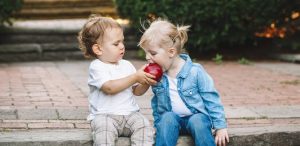Gospel reading: Luke 9:11-17.
 Vs.11 Jesus made the crowds welcome and he talked to them about the kingdom of God; and he cured those who were in need of healing.
Vs.11 Jesus made the crowds welcome and he talked to them about the kingdom of God; and he cured those who were in need of healing.
Vs.12 It was late afternoon when the twelve came to him and said, “Send the people away, and they can go to the villages and farms round about to find lodging and food, for we are in a lonely place here.”
Vs.13 He replied, “Give them something to eat yourselves.”
But they said, “We have no more than five loaves and two fish, unless we are to go ourselves and buy food for all these people.”
Vs.14 For there were about five thousand men. But he said to his disciples, “Get them to sit down in parties of about fifty.”
Vs.15 They did so and made them all sit down.
Vs.16 Then he took the five loaves and the two fish, raised his eyes to heaven, and said the blessing over them; then he broke them and handed them to the disciples to distribute to the crowd.
Vs.17 They all ate as much as they wanted, and when the scraps remaining were collected they filled twelve baskets.
Luke 9: 11-17
The Body and Blood of Christ
The feast of Corpus Christi celebrates the teaching on the sacrament of Eucharist. We celebrate our faith in the real presence of Jesus under the appearance of bread and wine. Through our Lectio journey with the word of God we enter into a deeper appreciation of that “real presence” manifested throughout his life and definitively in his self-giving love on the cross. The feeding of the multitudes is the only miracle recounted in all four gospels. It recalls previous miracles from the Old Testament – (Exodus 16: 13-18 – miracle of Manna in the wilderness)- and foreshadows the sacramental miracle of the Eucharist. It also connects with the larger theme in Luke where Jesus describes God’s Kingdom as a great feast – a foretaste of the messianic banquet. Luke’s gospel story of the feeding of the five thousand has strong Eucharistic overtones, “He took…and blessed and broke and gave..” And at the same time teaches us important lessons as to where we can encounter this real presence in ordinary, everyday life – in feeding the hungry, caring and sharing, serving and conserving
Where did this take place?
This took place at Bethsaida, a fishing town on the northern shore of the Sea of Galilee. It was the home town of Peter, Andrew and Philip and was administered on behalf of the Romans by Herod Philip (reference is made to him in preceding verses).
When did this take place?
The Apostles have just regrouped and reported on their missionary exploits, and it would seem that Jesus intended to have some down-time with them in Bethsaida but the crowds came to hear of their movements and gathered in huge numbers.
It has been a long day of welcoming, preaching and healing activities and evening is now closing in.
Who was there?
The crowds (5000 people) who had probably been together with Jesus and the apostles for most of the day.
What happened?
V11- sets the scene where Luke tells us that Jesus welcomed the crowd, talked to them about the Kingdom – what the world will be like whenever God truly becomes king- a world where people would care for each other, respect each other, be merciful towards each other, a world where no-one would feel excluded, where all God’s children would be provided for. A kingdom, Jesus believed, that was already breaking into the world and, as always, he was challenging his hearers to enter into it now.
V12- the disciples, aware that many people would have travelled some distances, and probably with inadequate provisions, and conscious that evening was falling, believed it was in everyone’s best interest (including their own!) to disperse the crowd so that each could find provision and lodgings for themselves and their own families. Everyone for himself.
V13- But Jesus challenged his disciples take stock of whatever food they had and to be willing to share it with others.
V14- Showing great practical wisdom Jesus instructed his disciples to divide up the crowd into smaller groupings. Because in these smaller gatherings everyone could be accounted and provided for, and sharing out the food would be much easier and manageable.
V15- By inviting them to sit down his concern was that everyone would be comfortable and relaxed. “Sitting down together” provided a wonderful image of equality and inclusivity. A sense of community and an active awareness of each other would be more possible in smaller gatherings.
V16- When Jesus took the loaves and fish he “raised his eyes to heaven” recognizing that the Father is the source and origin of all; and that everything is truly gift. In the blessing he expresses his thanksgiving; and the proceeded to break the bread. This “breaking of bread” captures the dynamic of his whole life- making bits of himself in the service of others, and then definitively, in the supreme moment of self-giving on the cross when his body was broken and his blood spilled.
Then he ‘handed them to his disciples to distribute”- Jesus recognizes that this work of providing for others requires collaboration and imitation of his example.
V17- “they all ate as much as they wanted”- They were amazed and astounded to discover that there was more than enough to provide for everyone’s need, and even food left over “twelve baskets of broken pieces”. “The scraps remaining were collected” – nothing was wasted, responsibility was taken for cleaning up, and the environment was respected.
In the Celebration of the sacrament of the Eucharist the community gathers to remember and make present the living and life-giving love of Jesus, manifest in his earthly life and death, and manifest today in the life of his followers..as they “take” and “bless” and “break” and give of themselves generously in the service of others.
Some suggested Guidelines for Meditation 
Can we remember people in whose company we have felt welcome, could talk about some of the deeper things in life, where we have felt listened to and nourished?
Can we remember an experience of being very much aware of the great needs of those around us, and rather than do something about it ourselves, we were very quick to pass them on to someone else?
Can we remember somebody or some event that brought home to us that we are our brothers and sisters keeper, and we felt challenged “to give them something to eat ourselves?”
Can we remember being faced with a challenging situation and we felt so inadequate, so unqualified or unfit to respond – “we had only five loaves and two fish,” and what was that among so many?
Can we remember when we humbly and hesitantly took our “five loaves and two fish,” “raised our eyes to heaven” and gave it to others and we were amazed what it meant to them, how it satisfied their hunger and our own?
Can we remember experiences where we have been “taken,” “blessed,” “broken,” and “given,” as real food to satisfy the hunger of those in need?
Can we remember an experience of sharing food or resources and we were greatly surprised to find that not only did everyone eat as much as they wanted but when “the scraps remaining were collected they filled twelve baskets?
Let the prayers of thanksgiving, repentance and petition flow from your meditation – ideally these are expressed in our own words interlaces with words from the passage. (See introduction to Lectio stages.)
Let the rich silence of God’s presence grow and deepen as we journey to a prayer of no words and no images – simple presence to the presence of God. (Contemplative moment – see introduction).
We reflect on our experience of the work of God in the passage and in life until a truth or some truths emerge – new insights into life and love – which can be savoured and celebrated in prayer as they release their life-giving power in us, moulding and shaping our minds and hearts and bearing fruit in our lives. (Wisdom Moment – see introduction).
